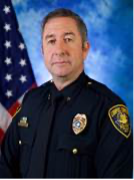Mr. William “Billy” Breedlove
MS in Criminal Justice, Class of 2020
Deputy Chief of Corpus Christi Police Department
Deputy Chief of Corpus Christi Police Department
Interviewed by Ja’Naya Bob on 03/8/2023


‘Since we changed our approach, we have had no in-custody deaths from excited delirium in our department (Corpus Christi Police Department). And all because I took a class with Dr. Worley’
‘I was able to complete my Master’s degree in a very short time, in a two-year time frame. I have been in law enforcement for 33 years. Prior to that I worked in the Texas Department of Corrections in Huntsville. I attended Sam Houston State University. Dr. Robert Worley had done the same thing and lot of his research comes from TDC. So, it is nice to see that. So, I felt a connection. One of the other interesting things is that I was able to get published with Dr. Vidisha Worley with the Academy of Criminal Justice Sciences. I took her class; it was a law class. We had to do a research paper. I did mine on the legal aspects of officers dealing with excited delirium. Here, like any other police department, we have wrestled with the problem of excited delirium. Some are ruled as homicide and officers would have to go through Grand Jury in some cases. After we published our paper, I started working in our department on policies on how to deal with persons suffering from excited delirium. I included our fire department in it. Now, we classify them as medical emergencies. We train with the medics. Earlier we used to struggle with them and take them to jail, where they would have cardiac arrest. Since we changed our approach, we have had no in-custody deaths from excited delirium in our department. And all because I took a class with Dr. Worley. She is a great lady. She really helped me out. She is very well-versed on excited delirium and taser use. She added some of her stuff and we published together. I went to the IACP this past year and talked about it…Overtime you will see more departments really getting away from engaging physically with these people and treat these as medical emergencies rather than as criminal offenses.’